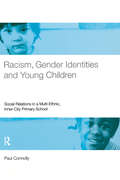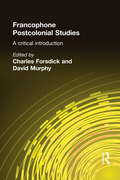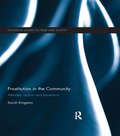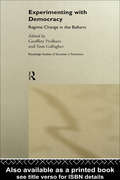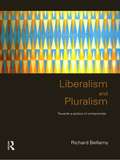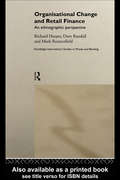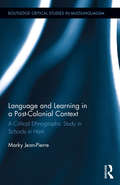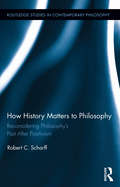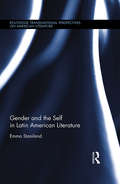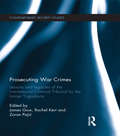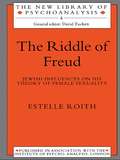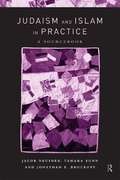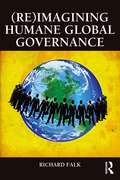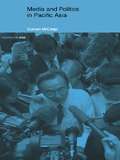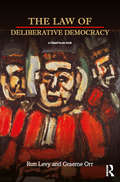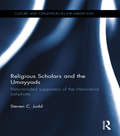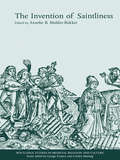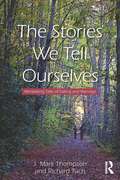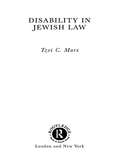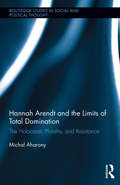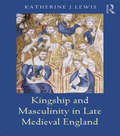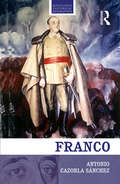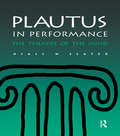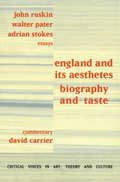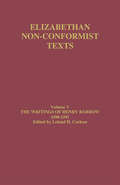Special Collections
Benetech’s Global Certified Accessible Titles
Description: Benetech’s GCA program is the first independent third-party EPUB certification to verify ebook accessibility. By creating content that is born accessible, publishers can meet the needs of all readers. Learn more: https://bornaccessible.benetech.org/
- Table View
- List View
Racism, Gender Identities and Young Children
by Paul ConnollyThis book offers a fascinating yet disturbing account of the significance of racism in the lives of five and six year old children, drawing upon data from an in-depth study of an inner-city, multi-ethnic primary school and its surrounding community. It represents one of the only detailed studies to give primacy to the voices of the young children themselves - giving them the space to articulate their own experiences and concerns. Together with detailed observation of the children in the school and local community, it provides an important account of how and why they draw upon discourses on race in the development of their gender identities.The book graphically highlights the understanding that these children have of issues of race, gender and sexuality and the active role they play in using and reworking this knowledge to make sense of their experiences.
Francophone Postcolonial Studies
by David Murphy and Charles ForsdickThis landmark text constitutes the first comprehensive overview of Francophone Postcolonial Studies. Moving away from reductive geographical or linguistic surveys of the Francophone world, this collection of original essays provides a thematic discussion of the complex historical, political and cultural links between France and its former colonies. Providing a theoretical framework for postcolonial criticism of the field, it also aims to trigger a genuine dialogue between Francophone and Anglophone scholars of postcolonialism.Part I provides a historical overview, from the eighteenth to the twentieth century, addressing issues of colonialism, slavery and exoticism. Part II looks at language issues and discusses France's belief in the universality of its language and culture and the postcolonial challenges to that view. Part III discusses issues of diversity and multiculturalism in contemporary Francophone cultures. Part IV concludes with an analysis of the French-language contribution to postcolonialism as well as an examination of Francophone postcolonial thought and culture in the principal areas of the French-speaking world.Edited by two of the up-and-coming names in Francophone Postcolonial Studies, the collection includes contributions from an international team including some of the world's leading scholars in the field.
Prostitution in the Community
by Sarah KingstonProstitution often causes significant anxiety for communities. These communities have been known to campaign against its presence in ‘their’ neighbourhoods, seeking the removal of street sex workers and their male clients. Although research and literature has begun to explore prostitution from the standpoint of the community, there is no comprehensive text which brings together some of the current literature in this area. This book aspires to cast light on some of this work by exploring the nature, extent and visibility of prostitution in residential communities and business areas, considering the legal and social context in which it is situated, and the community responses of those who live and work in areas of sex work. This book aims to examine current literature on the impacts of prostitution in residential areas and considers how different policy approaches employed by the police and local authorities have mediated and shaped the nature of sex work in different communities. It explores what communities think about prostitution and those involved, as well as studies the techniques and strategies communities have utilized to take action against prostitution in their neighbourhoods. This book will also demonstrate the diversity of public attitudes, action and reaction to prostitution in the community. This book is a useful contribution for academics and researchers in the fields of Criminology and Sociology who wish to understand current policy initiatives surrounding the issue of prostitution in local, national and international community settings.
Experimenting With Democracy
by Tom Gallagher and Geoffrey PridhamThe chronic instability in the Balkan States of South East Europe has prevented the end of the Cold War becoming an era of genuine peace in Europe. Against a background of competing nationalisms, economic decline, the resilience of authoritarianism, it is easy to forget that there have been experiments with democracy have taken place since 1990 with relative success. Now, for the first time, the region is genuinely engaging with open politics; its outcome will determine whether the Balkans can cease being a byword for instability, and an area whose shock-waves have disturbed the peace of Europe on many occasions. Democratisation in the Balkans explores the obstacles impeding the consolidation of democracy, and even preventing a state like Serbia from going very far down the democratic road. Social scientists with expert knowledge of each of the Balkan states, and their political and economic systems, examine why progress in building free institutions has been slow compared to that of Central Europe, the Iberian peninsula and Latin America.
Liberalism and Pluralism
by Richard BellamyIn Liberalism and Pluralism the author explores the challenges conflicting values, interests and identities pose to liberal democracy. Richard Bellamy illustrates his criticism and proposals by reference to such topical issues as the citizens charter, constitutional reform, the Rushdie affair and the development of the European Union.
Organisational Change and Retail Finance
by David Randall and Richard Harper and Mark RouncefieldFinancial organizations, like many others, are undergoing radical change. This is affecting both their organizational processes and the technology that supports those processes. This book reports on the use of sociological ethnography in helping guide these changes, both in terms of helping better understanding and redraw work processes and through providing more accurate and flexible understanding of the role technology plays. It places the reported research in context by contrasting it with those approaches more commonly associated with change, including business process engineering, participative design and soft systems methodologies. The book explains what are the benefits of ethnography, as well as the potential it has in helping achieve more desirable change in any and all organizations, financial services included. The book will be of interest to all international researchers concerned with organizational and technological change, as well as managers of organisational development. It will also interest advanced students in sociology, anthropology, management science and organizational studies The authors have published widely in the various disciplines associated with organizational life and technology design, and have built a considerable reputation for bringing new sociological insights into the organizational change literature
Language and Learning in a Post-Colonial Context
by Marky Jean-PierreThis book explores the social, political, and historical forces that mediate language ideology and practices in post-colonial education and how such ideology and practices influence students’ academic achievement. Jean-Pierre provides empirical evidence that a relationship exists between language practices and school underperformance. He takes Haiti as the focus of study, finding that students and teachers experience difficulty constructing knowledge in a setting in which the language they speak at home (Creole) differs from the language of instruction (French). The research is based on ethnographic data collected in classrooms in both private and public school settings in addition to different sectors of the society (e.g. state and private institutions).
How History Matters to Philosophy
by Robert C. ScharffIn recent decades, widespread rejection of positivism’s notorious hostility toward the philosophical tradition has led to renewed debate about the real relationship of philosophy to its history. How History Matters to Philosophy takes a fresh look at this debate. Current discussion usually starts with the question of whether philosophy’s past should matter, but Scharff argues that the very existence of the debate itself demonstrates that it already does matter. After an introductory review of the recent literature, he develops his case in two parts. In Part One, he shows how history actually matters for even Plato’s Socrates, Descartes, and Comte, in spite of their apparent promotion of conspicuously ahistorical Platonic, Cartesian, and Positivistic ideals. In Part Two, Scharff argues that the real issue is not whether history matters; rather it is that we already have a history, a very distinctive and unavoidable inheritance, which paradoxically teaches us that history’s mattering is merely optional. Through interpretations of Dilthey, Nietzsche, and Heidegger, he describes what thinking in a historically determinate way actually involves, and he considers how to avoid the denial of this condition that our own philosophical inheritance still seems to expect of us. In a brief conclusion, Scharff explains how this book should be read as part of his own effort to acknowledge this condition rather than deny it.
Gender and the Self in Latin American Literature
by Emma StanilandThis book explores six texts from across Spanish America in which the coming-of-age story ('Bildungsroman') offers a critique of gendered selfhood as experienced in the region’s socio-cultural contexts. Looking at a range of novels from the late twentieth century, Staniland explores thematic concerns in terms of their role in elucidating a literary journey towards agency: that is, towards the articulation of a socially and personally viable female gendered identity, mindful of both the hegemonic discourses that constrain it, and the possibility of their deconstruction and reconfiguration. Myth, exile and the female body are the three central themes for understanding the personal, social and political aims of the Post-Boom women writers whose work is explored in this volume: Isabel Allende, Laura Esquivel, Ángeles Mastretta, Sylvia Molloy, Cristina Peri Rossi and Zoé Valdés. Their adoption, and adaptation, of an originally eighteenth-century and European literary genre is seen here to reshape the global canon as much as it works to reshape our understanding of gendered identities as socially constructed, culturally contingent, and open-ended.
Prosecuting War Crimes
by Rachel Kerr and James Gow and Zoran PajićThis volume examines the legacy of the International Criminal Tribunal for the former Yugoslavia (ICTY), which was created under Chapter VII of the UN Charter as a mechanism explicitly aimed at the restoration and maintenance of international peace and security. As the ICTY has now entered its twentieth year, this volume reflects on the record and practices of the Tribunal. Since it was established, it has had enormous impact on the procedural, jurisprudential and institutional development of international criminal law, as well as the international criminal justice project. This will be its international legacy, but its legacy in the region where the crimes under its jurisdiction took place is less clear; research has shown that reactions to the ICTY have been mixed among the communities most affected by its work. Bringing together a range of key thinkers in the field, Prosecuting War Crimes explores these findings and discusses why many feel that the ICTY has failed to fully engage with people’s experiences and meet their expectations. This book will be of much interest to students of war crimes, international criminal law, Central and East European politics, human rights, and peace and conflict studies.
The Riddle of Freud
by Estelle RoithIn The Riddle of Freud Estelle Roith argues that certain important elements of Judaic culture were so integral a part of Freud's personality that they became visible in his work and especially in his attitudes to and theories of femininity. Freud's formulation of femininity, which the author contends is mistaken, is seen not as a simple error but as resulting from a complex bias in which personal and social factors are interrelated. The author proposes that the considerable ambivalence experienced by Freud about his sexual, cultural, and social identity, in which both overt and covert aspects of his Jewish culture survived, could not be surmounted by him in the case of women. Estelle Roith describes Freud's theory of femininity and its implications for psychoanalytic theories of human development and motivation in general. She examines Freud's relationships with his women disciples and also the social and political conditions that obtained for Jews of Freud's time. Finally, her book helps illuminate the reasons for Freud's emphasis on the paternal power within the Oedipus complex. It is essential reading for psychoanalysts and psychotherapists, for students of women's issues, and all those interested in Freud's impact on contemporary Western thought.
Judaism and Islam in Practice
by Jacob Neusner and Jonathan E. Brockopp and Tamara SonnJudaism and Islam compare because they concur that God cares deeply not only about attitudes but actions, not only about what one says to God but how one conducts affairs at home and in the village.In this sourcebook, the authors have selected key passages from the laws of Judaism and Islam which allow a close examination of their mode of expression and medium of thought as well as the substance of the laws themselves. The selected passages concentrate on areas critical to the life of piety and faith as actually practised within the two faith-communities - the relationship between the believer and God, between and among believers, at home in marriage, outside the home in the community and between the faithful and the infidels (for Islam) or idolaters (for Judaism).Judaism and Islam in Practice presents an invaluable collection of sources of Jewish and Islamic law and provides a unique analysis of the similarities and contrasts between the two faiths.
(Re)Imagining Humane Global Governance
by Richard FalkIn this important and path-breaking book, esteemed scholar and public intellectual Richard Falk explores how we can re-imagine the system of global governance to make it more ethical and humane. Divided into three parts, this book firstly scrutinizes the main aspects of Global Governance including, Geopolitics, The Future of International law, Climate Change and Nuclear weapons, 9/11, Global Democracy and the UN. In the last part, Falk moves the discussion on to the search for Progressive Politics, the Israel/Palestinian conflict and the World Order Models Project. Drawing on, but also rethinking the normative tradition in international relations, he examines the urgent challenges that we must face to counter imperialism, injustice, global poverty, militarism and environmental disaster. In so doing, he outlines the radical reforms that are needed on an institutional level and within global civil society if we are to realize the dream of a world that is more just, equitable and peaceful. This important work will be of interest to all students and scholars of global politics and international relations.
Media and Politics in Pacific Asia
by Duncan McCargoMedia and Politics in Pacific Asia is the first book to provide a detailed account of the political influences exerted by both domestic and international media in Pacific Asia. Duncan McCargo argues that the media are political actors and institutions in their own right, and that as such they can play a variety of political roles, some of which support processes of demographic transition and consolidation, and some which do just the opposite. Drawing on first-hand research in Hong Kong, Indonesia, Japan and Thailand - and employing comparative examples that include Burma, Malaysia and the Phillipines - Duncan McCargo examines the various influences of the Media as agents of stability, restraint and change. He also analyses pressures on the media from a range of state, non-state and market forces, and sets out to problematize simplistic readings of issues such as media freedom, ownership, partisanship, profitability, regulation and public interest. The result is an in-depth and fascinating study of the interplay between the media and the political process. Written in a clear and accessible style with numerous examples, this highly original book will be useful to academics, students, journalists, and general readers interested in Asian studies, media and politics.
The Law of Deliberative Democracy
by Ron Levy and Graeme OrrLaws have colonised most of the corners of political practice, and now substantially determine the process and even the product of democracy. Yet analysis of these laws of politics has been hobbled by a limited set of theories about politics. Largely absent is the perspective of deliberative democracy – a rising theme in political studies that seeks a more rational, cooperative, informed, and truly democratic politics. Legal and political scholarship often view each other in reductive terms. This book breaks through such caricatures to provide the first full-length examination of whether and how the law of politics can match deliberative democratic ideals. Essential reading for those interested in either law or politics, the book presents a challenging critique of laws governing electoral politics in the English-speaking world. Judges often act as spoilers, vetoing or naively reshaping schemes meant to enhance deliberation. This pattern testifies to deliberation’s weak penetration into legal consciousness. It is also a fault of deliberative democracy scholarship itself, which says little about how deliberation connects with the actual practice of law. Superficially, the law of politics and deliberative democracy appear starkly incompatible. Yet, after laying out this critique, The Law of Deliberative Democracy considers prospects for reform. The book contends that the conflict between law and public deliberation is not inevitable: it results from judicial and legislative choices. An extended, original analysis demonstrates how lawyers and deliberativists can engage with each other to bridge their two solitudes.
Religious Scholars and the Umayyads
by Steven JuddReligious Scholars and the Umayyads analyzes legal and theological developments during the Marwānid period (64/684--132/750), focusing on religious scholars who supported the Umayyads. Their scholarly network extended across several generations and significantly influenced the development of the Islamic faith. Umayyad qādòīs, who represented the intersection of religious authority and imperial power, were particularly important. This book challenges the long-standing paradigm that the emerging Muslim faith was shaped by religious dissenters who were hostile to the Umayyads. A prosopographical analysis of Umayyad-era scholars demonstrates that piety and opposition were not necessarily synonymous. Reputable scholars served as qādòīs, tutors and advisors to Umayyad caliphs and governors. Their religious credentials were untarnished by their association with the Umayyads and they appear prominently in later hòadīth collections and fiqh works. This historiographical study demonstrates that excessive reliance on al-Tòabarī’s chronicle has distorted the image of the Umayyads. Alternatively, biographical sources produced by later hòadīth scholars reveal a rich tradition of Umayyad-era religious scholarship that undermines al-Tòabarī’s assumptions. Offering a better understanding of early Islamic religious development, this book is a valuable resource for students and researchers in the fields of Islamic history, Islamic legal studies and Arabic historiography.
The Invention of Saintliness
by Anneke B. Mulder-BakkerThis volume discusses, from an historical and literary angle, the ways in which sanctification and the inscription of saintliness take place. Going beyond the traditional categories of canonization, cult, liturgical veneration and hagiographical lives, the work raises fundamental issues concerning definitions of saints and saintliness in a period before the concept was crystallized in canon law. As well as discussing sources and methodology, contributions cover contextual issues, including relics and veneration, life and the afterlife, and examinations of specific sources and texts. Subjects raised include the idea of hagiography as intimate biography, perceptions of holiness in writings by and about female mystics, and bodily aspects of the Franciscan search for evangelical perfection.
The Stories We Tell Ourselves
by Richard Tuch and J. Mark ThompsonThe Stories We Tell Ourselves: Mentalizing Tales of Dating and Marriage is about the dynamics of intimate interpersonal relationships (dating and marriage) - how and why human pairings occur, what helps them function optimally and how therapists can intervene when they don't. J. Mark Thompson and Richard Tuch employ a multidimensional perspective that provides a variety of "lenses" through which intimate relationships can be viewed. The authors also offer a new model of couples therapy based on the mentalization model of treatment developed by Peter Fonagy and his colleagues. This book is aimed at those interested in the nature of intimate relationships as well as those wishing to expand their clinical skills, whether they are conducting one-on-one therapy with individuals struggling to establish and maintain intimate relations or are conducting conjoint treatment with troubled couples who have sought the therapist's assistance. Thompson and Tuch view relationships from a wide array of different perspectives: mentalization, attachment theory, evolutionary psychology, psychoanalysis, pattern recognition (neuroscience), and role theory. A mentalization based approach to couples therapy is clearly explained in a "how to" fashion, with concrete suggestions about how the therapist goes about clinically intervening given their expanded understanding of the dynamics of intimate relations outlined in the book. The Stories We Tell Ourselves: Mentalizing Tales of Dating and Marriage will appeal to psychoanalysts, psychotherapists, psychiatrists, psychologists, clinical social workers, marriage therapists, and all those interested in both learning more about the dynamics of one-on-one intimate relationships (dating and marriage) from a truly multidimensional perspective and in learning how to conduct mentalization-based couples therapy.
Disability in Jewish Law
by Tzvi C. MarxIn recent decades, record numbers of Jews are taking a newfound interest in their legal heritage - the Bible and the Talmud, the law codes and the rabbinical responsa literature. In the course of this encounter, they may be interested in how these sources relate to the issue of disability, and the degree to which halakhic attitudes to disability are in harmony with contemporary sensibilities. For example, can the blind or those in wheelchairs serve as prayer leaders? Need the mentally incompetent observe any ritual law? Is institutionalization in a special-education facility where Jewish dietary laws are not observed permitted if it will enhance a child's functioning? And how are we to interpret teachings that seem inconsonant with current sensibilities? Disability in Jewish Law answers the pressing need for insight into the position of Jewish law with respect to the rights and status of those with physical and mental impairments, and the corresponding duties of the non-disabled.
Hannah Arendt and the Limits of Total Domination
by Michal AharonyResponding to the increasingly influential role of Hannah Arendt’s political philosophy in recent years, Hannah Arendt and the Limits of Total Domination: The Holocaust, Plurality, and Resistance, critically engages with Arendt’s understanding of totalitarianism. According to Arendt, the main goal of totalitarianism was total domination; namely, the virtual eradication of human legality, morality, individuality, and plurality. This attempt, in her view, was most fully realized in the concentration camps, which served as the major "laboratories" for the regime. While Arendt focused on the perpetrators’ logic and drive, Michal Aharony examines the perspectives and experiences of the victims and their ability to resist such an experiment. The first book-length study to juxtapose Arendt’s concept of total domination with actual testimonies of Holocaust survivors, this book calls for methodological pluralism and the integration of the voices and narratives of the actors in the construction of political concepts and theoretical systems. To achieve this, Aharony engages with both well-known and non-canonical intellectuals and writers who survived Auschwitz and Buchenwald concentration camps. Additionally, she analyzes the oral testimonies of survivors who are largely unknown, drawing from interviews conducted in Israel and in the U.S., as well as from videotaped interviews from archives around the world. Revealing various manifestations of unarmed resistance in the camps, this study demonstrates the persistence of morality and free agency even under the most extreme and de-humanizing conditions, while cautiously suggesting that absolute domination is never as absolute as it claims or wishes to be. Scholars of political philosophy, political science, history, and Holocaust studies will find this an original and compelling book.
Kingship and Masculinity in Late Medieval England
by Katherine LewisKingship and Masculinity in Late Medieval England explores the dynamic between kingship and masculinity in fifteenth century England, with a particular focus on Henry V and Henry VI. The role of gender in the rhetoric and practice of medieval kingship is still largely unexplored by medieval historians. Discourses of masculinity informed much of the contemporary comment on fifteenth century kings, for a variety of purposes: to praise and eulogise but also to explain shortcomings and provide justification for deposition. Katherine J. Lewis examines discourses of masculinity in relation to contemporary understandings of the nature and acquisition of manhood in the period and considers the extent to which judgements of a king’s performance were informed by his ability to embody the right balance of manly qualities. This book’s primary concern is with how these two kings were presented, represented and perceived by those around them, but it also asks how far Henry V and Henry VI can be said to have understood the importance of personifying a particular brand of masculinity in their performance of kingship and of meeting the expectations of their subjects in this respect. It explores the extent to which their established reputations as inherently ‘manly’ and ‘unmanly’ kings were the product of their handling of political circumstances, but owed something to factors beyond their immediate control as well. Consideration is also given to Margaret of Anjou’s manipulation of ideologies of kingship and manhood in response to her husband’s incapacity, and the ramifications of this for perceptions of the relational gender identities which she and Henry VI embodied together. Kingship and Masculinity in Late Medieval England is an essential resource for students of gender and medieval history.
Franco
by Antonio Cazorla-SanchezGeneral Francisco Franco, also called the Caudillo, was the dictator of Spain from 1939 until his death in 1975. His life has been examined in many previous biographies. However, most of these have been traditional, linear biographies that focus on Franco’s military and political careers, neglecting the significance of who exactly Franco was for the millions of Spaniards over whom he ruled for almost forty years. In this new biography Antonio Cazorla-Sanchez looks at Franco from a fresh perspective, emphasizing the cultural and social over the political. Cazorla-Sanchez's Franco uses previously unknown archival sources to analyse how the dictator was portrayed by the propaganda machine, how the opposition tried to undermine his prestige, and what kind of opinions, rumours and myths people formed of him, and how all these changed over time. The author argues that the collective construction of Franco’s image emerged from a context of material needs, the political traumas caused by the Spanish Civil War (1936-1939), the complex cultural workings of a society in distress, political manipulation, and the lack of any meaningful public debate. Cazorla-Sanchez's Franco is a study of Franco’s life as experienced and understood by ordinary people; by those who loved or admired him, by those who hated or disliked him, and more generally, by those who had no option but to accommodate their existence to his rule. The book has a significance that goes well beyond Spain, as Cazorla-Sanchez explores the all-too-common experience of what it is like to live under the deep shadow cast by an always officially praised, ever present, and long lasting dictator.
Plautus in Performance
by Niall W. SlaterPlautus was Ancient Rome's greatest comic playwright, Shakespeare drew heavily on his plots, and his legacy is prevalent throughout modern drama. In this expanded edition of his successful book, one of America's foremost Classical scholars introduces performance criticism to the study of Plautus' ancient drama. In addition to the original detailed studies of six of the dramatists's plays, the methodology of performance criticism, the use of conventions, and the nature of comic heroism in Plautus, this edition includes new studies on: * the induction into the world of the play * the scripted imitation of improvisation * Plautus's comments on his previous work * the nature of 'tragicomedy'.
England and its Aesthetes
by David CarrierFirst Published in 1999. Routledge is an imprint of Taylor & Francis, an informa company.
The Writings of Henry Barrow, 1590-91
by Leland H. CarlsonThis volume contains the great Separatist's solus writings from 1590-1591. It includes texts taken from manuscript sources, and rare tracts that have been reprinted here for the first time.
